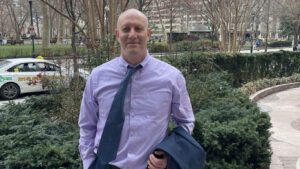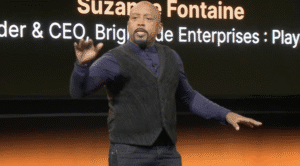Dr. Andre Posner is a hospitalist, award-winning educator, and lifelong student of medicine who brings clarity, compassion, and mentorship to every level of his work.
Born in Dakar, Senegal, during his parents’ Peace Corps service, and raised in Merion Station, Pennsylvania, in a home filled with the energy of multiple generations and seven children, Dr. Posner developed a strong moral compass shaped by community and service. Inspired by his father’s medical legacy—helping to eradicate smallpox across Africa—he earned his undergraduate degree at the Philadelphia College of Pharmacy and Sciences and completed his medical education at Nova Southeastern University’s College of Osteopathic Medicine. Over his career at institutions such as Frankford Hospital, Main Line Health, and Penn Medicine, he has combined rigorous clinical work with passionate teaching. Dr. Andre Posner has been recognized with numerous awards for his excellence in education, including multiple resident and faculty teaching honors. Outside the hospital, he turns to nature, chess, and meditation to maintain his grounding and reflect on the bigger picture of healing. He continues to lead by example, fostering human connection in a field increasingly shaped by technology and transformation.
What do you believe is the single most important trait a physician must cultivate today?
Adaptability. Medicine is changing faster than ever—technologically, administratively, culturally. But if we stay rigid, we miss what patients and colleagues truly need. Adaptability allows us to stay anchored in principles like empathy and integrity while being nimble enough to grow, learn, and respond to the evolving world around us. That doesn’t mean sacrificing who you are—it means expanding who you can be.
How did growing up in a multigenerational household influence your communication style as a doctor?
It taught me to listen—to really listen. You learn quickly that a grandparent doesn’t communicate like a teenager, and a younger sibling doesn’t think like an adult. Translating that into medicine, I learned to meet patients where they are, to sense what’s being said—and what isn’t. That early exposure to diverse voices sharpened my ability to connect across ages, backgrounds, and belief systems.
Do you remember a patient who fundamentally changed how you see your work?
Yes—many, but one in particular. He was an elderly man with end-stage cancer, but every day he would greet me with gratitude and humor. He taught me that healing isn’t always about curing. Sometimes it’s about presence, dignity, and shared humanity. That experience redefined success for me—it became less about outcome and more about connection.
What misconceptions do people often have about hospitalists?
That we’re transient or impersonal, since we don’t always have long-term patient relationships. But in reality, we’re the anchor during a patient’s most vulnerable moments. We orchestrate care, advocate fiercely, and often become a bridge between crisis and stability. Our work is intense, immediate, and deeply relational, even if it’s short-term.
How has teaching influenced your approach to practicing medicine?
Teaching forces clarity. You can’t explain what you don’t truly understand. It has made me more disciplined in my thinking and more reflective in my decision-making. More importantly, it has kept me humble. Students and residents ask questions that challenge my assumptions and push me to keep learning. It’s a beautiful feedback loop.
With so much change in healthcare, what remains timeless?
Trust. No matter the tools, platforms, or metrics, the relationship between a patient and a physician still relies on trust. And trust is built the old-fashioned way—through presence, consistency, honesty, and care. You can’t outsource that. You can’t automate it. It’s the beating heart of everything we do.
What advice would you give to your younger self on the first day of residency?
Slow down. Not your pace—but your attention. Don’t rush through the nuances, the silences, the pauses. That’s where the real stories live. Also, be kinder to yourself. You’ll make mistakes—own them, learn from them, but don’t carry them as weight. Carry them as wisdom.
What role do meditation and chess play in your life as a physician?
Meditation is my reset button—it quiets the noise and brings me back to center. Chess, on the other hand, sharpens strategy. It teaches me to think several moves ahead, anticipate outcomes, and weigh consequences. Together, they help me balance empathy with logic—heart with head. That balance is essential in both crisis care and long-term mentorship.
Have your patients ever taught you something that changed your worldview?
Absolutely. One patient, a young immigrant, told me through an interpreter that every interaction with the healthcare system felt like “a test she didn’t know the rules to.” That broke my heart and opened my eyes to how much we take health literacy for granted. Since then, I’ve been much more intentional about communication and access. Empathy isn’t just kindness—it’s clarity.
What legacy do you hope to leave in medicine?
That I helped restore the human element. That in an increasingly automated, metric-driven system, I reminded people—patients, trainees, peers—that healing is personal. I hope those I’ve mentored carry that torch forward: that they value listening as much as diagnosing, and presence as much as precision. If I’ve done that, I’ll consider it a life well spent.






